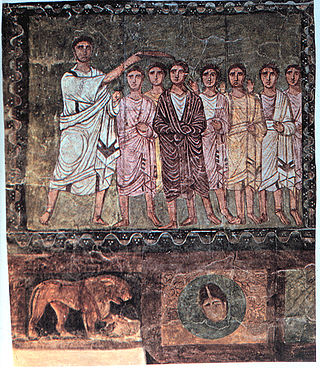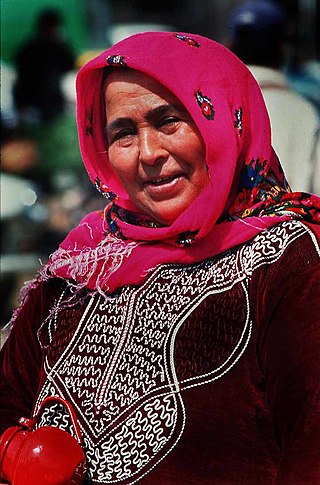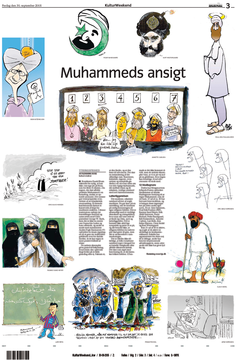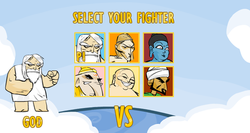
In Abrahamic religions, a messiah or messias is a saviour or liberator of a group of people. The concepts of mashiach, messianism, and of a Messianic Age originated in Judaism, and in the Hebrew Bible, in which a mashiach is a king or High Priest traditionally anointed with holy anointing oil. Χριστός, Greek for the Hebrew Messiah occurs 41 times in the LXX and the Hebrew Bible.

In modern usage, hijab generally refers to customary headcoverings worn by Muslim women. Many Muslims believe it is obligatory for every female Muslim who has reached the age of puberty to wear a head covering. While such headcoverings can come in many forms, hijab often specifically refers to a cloth wrapped around the head, neck and chest, covering the hair and neck but leaving the face visible.
Liberalism in Egypt or Egyptian liberalism is a political ideology that traces its beginnings to the 19th century.

Internet censorship in Pakistan is government control of information sent and received using the Internet in Pakistan. There have been significant instances of website access restriction in Pakistan, most notably when YouTube was banned from 2012–2016. Pakistan has asked a number of social media organisations to set up local offices within the country, but this is yet to happen.

Aniconism in Islam is the avoidance of images (aniconism) of sentient beings in some forms of Islamic art. Islamic aniconism stems in part from the prohibition of idolatry and in part from the belief that the creation of living forms is God's prerogative.

The Jyllands-Posten Muhammad cartoons controversy began after the Danish newspaper Jyllands-Posten published 12 editorial cartoons on 30 September 2005, most of which depicted Muhammad, a principal figure of the religion of Islam. The newspaper announced that this was an attempt to contribute to the debate about criticism of Islam and self-censorship. Muslim groups in Denmark complained, and the issue eventually led to protests around the world, including violence and riots in some Muslim countries.

In Islam, blasphemy is impious utterance or action concerning God, but is broader than in normal English usage, including not only the mocking or vilifying of attributes of Islam but denying any of the fundamental beliefs of the religion. Examples include denying that the Quran was divinely revealed, the Prophethood of one of the Islamic Prophets, insulting an angel, or maintaining God had a son.
Paolo Pedercini is an Italian game designer known for making Flash videogames based on provocative left-wing socio-political points of view, on topics such as labour market flexibility and Queer theory, in explicit opposition with the mainstream video game industry. He is also known under the pseudonym Molleindustria, the name of his website. He is known for games such as Queer Power, Faith Fighter and the McDonald's Video Game. The games are often offered as freeware under a Creative Commons license.
Raza Academy is a Muslim fundamentalist Islamist group based in Maharashtra, India. It was formed in 1978 by Alhaj Mohammed Saeed Noori as a small publishing house, and later became known for protests for the rights of Muslims. The group publishes books of Ahle Sunnah scholars in various languages, the Kanzul Iman translation of the Quran, and Fatawa-e-Razvia. The group also conducts charity and advocacy work for the Muslim community.
The Abrahamic religions are a group of religions centered around worship of the God of Abraham. Abraham, a Hebrew patriarch, is extensively mentioned throughout Abrahamic religious scriptures the Bible, Quran and Torah.

Fitna is a 2008 short film by Dutch parliamentarian Geert Wilders. Approximately 17 minutes in length, the film attempts to demonstrate that the Qur'an motivates its followers to hate all who violate Islamic teachings. The film shows selected excerpts from Surahs of the Qur'an, interspersed with media clips and newspaper cuttings showing or describing acts of violence and/or hatred by Muslims.
The international reaction to Fitna consisted of condemnation from Muslims, several fatwa against Geert Wilders, and attempts by many Islamic countries to censor the film. The Dutch government immediately distanced itself from the film. Several Muslim organizations and political parties organized boycotts against Dutch products.

Muslim Massacre: The Game of Modern Religious Genocide is a controversial 2008 amateur video game by former Something Awful forum member Eric Vaughn under the screen name "Sigvatr". It is a top-down shoot 'em up video game. The aim of the game is to kill all the Muslims that appear on the screen – in the words of its creator, "take control of the American hero and wipe out the Muslim race with an arsenal of the world's most destructive weapons."

The permissibility of depictions of Muhammad in Islam has been a contentious issue. Oral and written descriptions of Muhammad are readily accepted by all traditions of Islam, but there is disagreement about visual depictions. The Quran does not explicitly or implicitly forbid images of Muhammad. The ahadith present an ambiguous picture, but there are a few that have explicitly prohibited Muslims from creating visual depictions of human figures. It is agreed on all sides that there is no authentic visual tradition as to the appearance of Muhammad, although there are early legends of portraits of him, and written physical descriptions whose authenticity is often accepted.

Ahmadiyya, officially the Ahmadiyya Muslim Community or the Ahmadiyya Muslim Jama'at, is an Islamic revival or messianic movement originating in Punjab, British India, in the late 19th century. It was founded by Mirza Ghulam Ahmad (1835–1908), who claimed to have been divinely appointed as both the Promised Mahdi and Messiah expected by Muslims to appear towards the end times and bring about, by peaceful means, the final triumph of Islam; as well as to embody, in this capacity, the expected eschatological figure of other major religious traditions. Adherents of the Ahmadiyya—a term adopted expressly in reference to Muhammad's alternative name Aḥmad—are known as Ahmadi Muslims or simply Ahmadis.

Everybody Draw Mohammed Day was a 2010 event in support of artists threatened with violence for drawing representations of the Islamic prophet Muhammad. It stemmed from a protest against censorship of the American television show South Park episode "201", led by the show's distributor Comedy Central, in response to death threats that had been made against some of those responsible for two segments broadcast in April 2010. A drawing representing Mohammed was posted on the Internet on April 20, 2010, with a message suggesting that "everybody" create a drawing depicting Mohammad on May 20 in support of free speech.

Islamic teachings and argument have been used to censor opinions and writings throughout history, up to and including the modern era, and thus there are many cases of censorship in Islamic societies. One example is the fatwa against The Satanic Verses, ordering that the author be executed for blasphemy. Depictions of Muhammad have inspired considerable controversy and censorship. Some Islamic societies have religious police, who enforce the application of Islamic Sharia law.

Muhammad bin Abdul Karim Issa is a Saudi Arabian politician, Secretary General of the Muslim World League, President of the International Islamic Halal Organization, and former Saudi Minister of Justice.

The release of the anti-Islamic short film Innocence of Muslims triggered numerous demonstrations across North Africa, the Middle East and South Asia. On September 11, 2012, dozens of protestors scaled the walls and entered the courtyard of the U.S. embassy in Cairo, Egypt. On September 13, 2012 protests occurred at the U.S. embassy in Sana'a, Yemen, resulting in the deaths of four protesters and injuries to thirty-five protesters and guards. On September 14, the U.S. consulate in Chennai was attacked, resulting in injuries to twenty-five protesters. Protesters in Tunis, Tunisia, climbed the U.S. embassy walls and set trees on fire. At least four people were killed and forty-six injured during protests in Tunis on September 15. Further protests were held at U.S. diplomatic missions and other locations in the days following the initial attacks. Related protests and attacks resulted in numerous deaths and injuries across the Middle East, Africa, Pakistan, and Afghanistan.
The study of religion and video games is a subfield of digital religion, which the American scholar of communication, Heidi Campbell, defines as "Religion that is constituted in new ways through digital media and cultures.". Video games once struggled for legitimacy as a cultural product, today, however, they are both business and art. Video games increasingly turn to religion not just as ornament but as core elements of their video game design and play. Games involve moral decision, rely on invented religions, and allow users to create and experience virtual religious spaces. As one of the newest forms of entertainment, however, there is often controversy and moral panic when video games engage religion, for instance, in Insomniac Games' use of the Manchester Cathedral in Resistance: Fall of Man. Concepts and elements of contemporary and ancient religions appear in video games in various ways: places of worship are a part of the gameplay of real-time strategy games like Age of Empires; narratively, games sometimes borrow themes from religious traditions like in Mass Effect 2.















